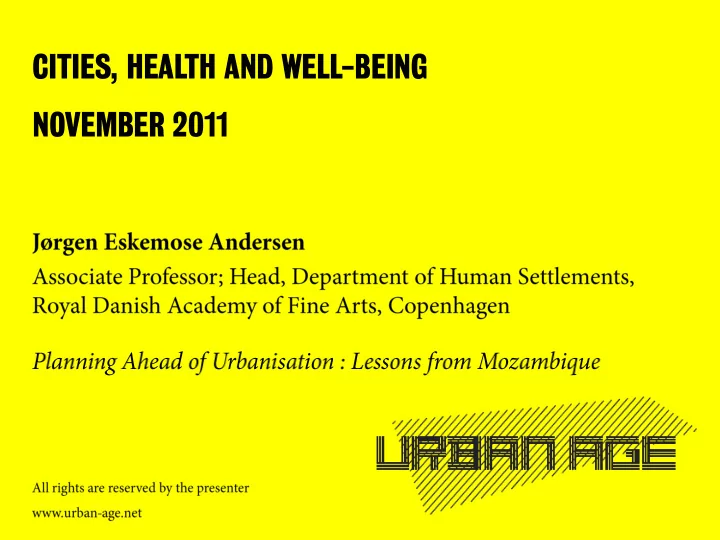

CITIES, HEALTH AND WELL-BEING NOVEMBER 2011
Planning ahead of urbanization: Lessons from Mozambique CITIES, HEALTH AND WELL BEING URBAN AGE CONFERENCE , HONG KONG 16-17 NOVEMBER 2011 Jørgen Eskemose Andersen Royal Danish Academy of Fine Arts School of Architecture Denmark
Mozambique, Maputo 2,5 mio inhabitants • Most live in informal settlements • High level of sense of tenure security and hence residents invest in their homes • Few consider urban life as temporary and hence links to the rural hinterland is weakening • Rudimentary infrastructure provision • Many households are female headed as many men are migrant labourers
Informal Settlement • All houses built in permanent materials • Water sold from standpipes or as individual connections • No sewer all sanitation as pit latrines or septic tanks • Most with electricity connection • Poor drainage • Few schools • Few health institutions • Relative many trees
Urban form • Few access roads • Few public open spaces and often in a miserable state • Some houses have access crossing neigbours private domain
Water provision Urban infrastructure • Public investments in building roads/drainage and water supply are insignificant • Few individual water connections • Selling water is a widespread business • Unit prizes higher in informal settlements
Improved pit latrine • A UN project promoting improved pit latrines have been a relative success
Economic activities • Many civil servants and private sector employees live in informal settlements • Many informal settlers engaged in informal petty trade • Food preparation is a common income generating activity executed by women
Table top shops
Informal selling of second hand clothing
The court yard • The court yard is an important private domain as a space for toilet and bathroom, kitchen and a working and social space
Multi-functional use of space • Cooking, storage of water and eventual sleeping may take place in the same room.
Smoke is an underestimated threat to health of women and children Charcoal is used as domestic fuel througout
Maputo landfill The landfill is a constant threat to health Waste pickers lives within or nearby the landfill
Layout as blocks 50 x 50m with plots 12,5 x 25M
Strategic Action Planning • All structures in permanent buildings • Some land reserves for public use demarcated, sold and built upon • Water provision left to private providers • No sewer. All sanitation as pit latrines or WC with septic tanks • Drainage and tared roads remains • Private minibuses servicing the area • Some schools and health institutions built • Few tertiary educational institutions built • Most places of employment in the informal service sector
A recent upgrading excercise acknowledging the existing residents 5 situação existente | uso do solo 7 6 legenda: 4 limite do bairro vias de acesso internas espaços livres Espaço Urbanizável zona residencial de média densidade Equipamento Público equipamentos de educação 3 Ministério da Agricultura Secretaria do bairro Outros equipamentos (envolvente) 1.Secretaria do bairro 2.Escola Unidade 24 3.Escola Secundária Noroeste II 4.Escola Noroeste I 2 5.Escola FPLM 6.Creche 7.Ministério da Agricultura 1 Espaço afecto à Estrutura Ecológica Zonas Húmidas zona susceptível a inundações
espaço a melhorar | planos de pormenor Project intervention allowing for vehicular acces and a few open cenário a longo prazo (10 anos) spaces legenda: área de simulação alargamentos e remoções
espaço a melhorar | planos de pormenor perfil existente
1.50 7.00 4.00 1.50 espaço a melhorar | planos de pormenor perfil proposto
Present proposal • Private sector buying out residents and subsequently all houses shall be demolished with residents left to their own destiny • Project at hold due to local resistance
Conclusion Urban Planning must be ahead of informal urbanisation processes Implementation of simple layouts with effective development control based on local involvement Participatory Upgrading of informal settlements with resettlement of excess population in appropriate sites
Recommend
More recommend